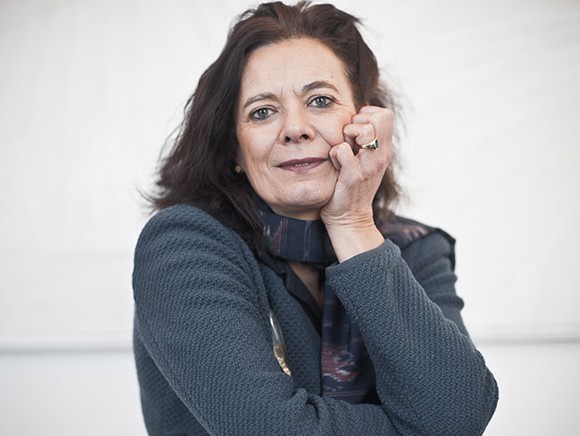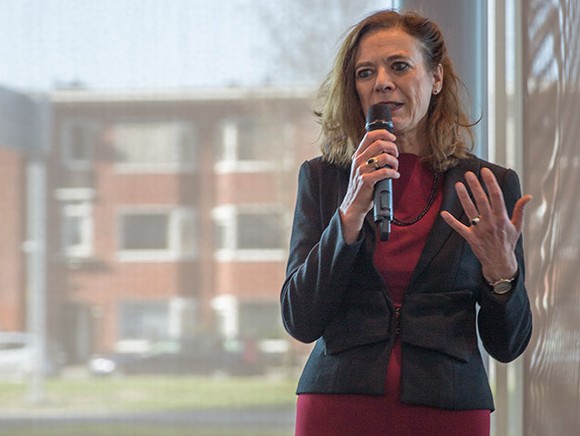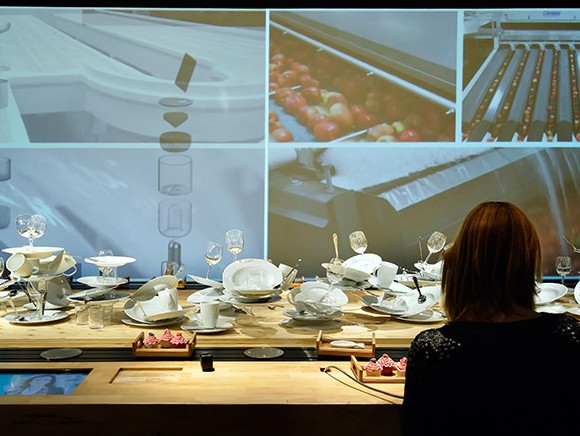
On 11 April 2016 #Foodtopia – an exhibition about the future of our food – opened at Rabobank headquarters. Food and agriculture expert Prof. Dr. Ir. Louise O. Fresco, chair of the executive board of Wageningen University and Research Centre, has put the exhibition together.
The display that has been set up in the foyer of the bank headquarters in Utrecht revolves around Fresco’s vision. It is a vision bursting with confidence in human ingenuity, technology and science. Foodtopia, the food of the future, is also the title of a publication by BWM, a foundation for the biosciences in society, which ties in with the exhibition. In the foreword, Fresco expands on what has already been achieved thanks in part to the industrialisation of food processing and the modernisation of manufacturing: “We are better fed and our food is safer than ever before.” And yet, she maintains, it is essential to do things differently. “Environmental problems, the effects of climate change and the impact on biodiversity are all problems that are linked to food production.”
At #Foodtopia visitors can watch videos of 11 different one-minute mini lectures on screens built into a large dining table. This article provides a brief description of each of the lectures. Although this provides an overview of the topics and indicates why they have been selected, it cannot do justice to the richness of content in the films themselves.
Some people have a romanticised view of life as a farmer. In reality, it is tough – harder than working in a factory. Many potential successors in farming families are rejecting the prospect of what they regard as ‘slave labour’. In the future, a large portion of a farmer’s work will be done by robots instead. How bad would it be if your tomatoes hadn’t been picked by human hands but rather by a small, elegant robot?
Shoppers find it very difficult to make wise choices from the wide range of products available in the supermarket. For example, there are dozens of different quality marks for sustainability alone. The diversity of products and the information about them can cause confusion. Many things are unclear. The consumer of the future will be well-informed. Whatever happens, the product range will be environmentally friendly and based on ‘fair trade’.
The biggest moral challenge of the future concerns the treatment of animals. Many people regard the way in which animals are raised and slaughtered as inhumane, but on the other hand they also enjoy eating meat. In the future we will treat animals as humanely as possible and put an end to animal suffering.
Since being introduced in the Netherlands a couple of centuries ago, the potato has evolved into a very valuable product and that trend will continue. In the future the potato will also be a source of ingredients with pharmaceutical benefits. Our exports of potato seeds – which have been available since 2015 – will flourish thanks to the productivity and quality of the Dutch potato.

“Insects will play a more important role in the protein-production chain”
With its high protein and calcium content, fish has made a significant contribution to the development of the human brain. Overfishing threatens the survival of many species. Relevant protection will enable fish populations to recover, although this will take time. Farmed fish can offer a sustainable alternative. The fish industry will enjoy strong growth and become the largest source of dietary protein.
Early man and his forebears ate insects, which are an excellent food source thanks to their balanced nutritional composition. In Africa locusts are called ‘sky prawns’ but so far not many people in Western society are inclined to accept insects as food. Nevertheless they are gaining in popularity as a snack or as an unrecognisable ingredient. Insects are efficient sources of protein and their contribution to greenhouse gas emissions is minimal. They will play a more important role in the protein-production chain and they will meet some of the protein needs of livestock in the form of mealworms.
Bread was the first ever processed foodstuff in history and it is a symbol of life in many cultures. It is the main food staple in a growing part of the world. Even though some people say we should eat less bread because they believe it is not good for our health, it will remain on the menu of the future. It is tasty and is a source of iron and vitamins, among other things.
For the past century there has been a surplus of food in a large part of the world. The days when we did not know where our next meal was coming from are behind us, but humans are still naturally hard-wired to want to consume a lot of energy-rich food to help them survive famine. As a consequence, there are more obese people than malnourished ones. We will have to learn to cope with the food surplus, but that will be a gradual process. Education will help, and the industry will contribute by offering smaller portions and reducing the content of unhealthy fats in products.
The apple remains popular in a large part of the world, partly because of its ability to adapt: the fruit grows well in climates ranging from the Netherlands to the Himalayas. We will continue to eat apples, perhaps including new varieties which contain less sugar and more vitamins.
Green and slimy, algae do not seem very appealing as food products and yet consumers will soon be eating them on a larger scale. These efficient plants can also be used as a source of biofuel and to filter water, such as for fish farming. Over the next decade we will see more algae-based products arriving on the market, such as algae burgers and algae-based pancakes.
Farmers, fishermen and processors are not currently treated with respect. In a relatively short space of time we have allowed a very small section of the population to become responsible for food production. A gulf has developed between the people who grow and process our food and the people who consume it. While there is a lot of criticism about the way our food is made, that often comes from people who do not understand how the food chain works. We should take more time to stop and think how about how hard some people work to ensure that we can put affordable, safe and healthy food on the table every day.

Pulses seem to be missing from the exhibition, even though they are also an important product of the future according to the likes of FAO, the UN’s food and agriculture organisation where Fresco has also worked for a number of years. However, the bean is featured in one form at least: visitors are asked whether they have confidence in Fresco’s vision of the future. They cast their votes by tossing a bean into one of two plastic containers. Two weeks after the opening of the exhibition, the large majority of visitors had used their beans to choose the following option: Yes, Louise O. Fresco’s vision gives me confidence in the future.
The #Foodtopia exhibition, Museum Boerhaave @ Rabobank is open during office hours and admission is free. Address: Rabo Inspiration Zone, Croeselaan 18, Utrecht, The Netherlands. The exhibition will run until 30 October.
Source: ©Jeroen Oerlemans, ©Boerhaave Museum, ©Caroline Kerkvliet